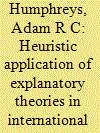| Srl | Item |
| 1 |
ID:
160124


|
|
|
|
|
| Summary/Abstract |
International politics has often been viewed as a brutal place where might trumps right and where, as a consequence, questions of democracy are irrelevant to ask. In the last decades, however, scholars and political leaders have increasingly suggested that elements of democracy exist in governance beyond individual states. If this is so, how does democracy beyond the state shape international politics? This article suggests conceptual preliminaries for theorising consequences of democracy beyond the state in general and their implications for problems of peace and conflict in particular. The purpose is twofold: first, to begin reconstructing existing normative democratic theory into an explanatory perspective sensitive to international politics; second, to indicate how this new perspective is able to explain empirical observations pertaining to conflict and cooperation among states; international institutions; foreign policies; human rights protection; and the violence of transnational terrorist networks.
|
|
|
|
|
|
|
|
|
|
|
|
|
|
|
|
| 2 |
ID:
105949


|
|
|
|
|
| Publication |
2011.
|
| Summary/Abstract |
Explanatory theorists increasingly insist that their theories are useful even though they cannot be deductively applied. But if so, then how do such theories contribute to our understanding of international relations? I argue that explanatory theories are typically heuristically applied: theorists' accounts of specific empirical episodes are shaped by their theories' thematic content, but are not inferred from putative causal generalizations or covering laws. These accounts therefore gain no weight from their purely rhetorical association with theories' quasi-deductive arguments: they must be judged on the plausibility of their empirical claims. Moreover, the quasi-deductive form in which explanatory theories are typically presented obscures their actual explanatory role, which is to indicate what sort of explanation may be required, to provide conceptual categories, and to suggest an empirical focus. This account of how theoretical explanations are constructed subverts the nomothetic-idiographic distinction that is often used to distinguish International Relations from History.
|
|
|
|
|
|
|
|
|
|
|
|
|
|
|
|